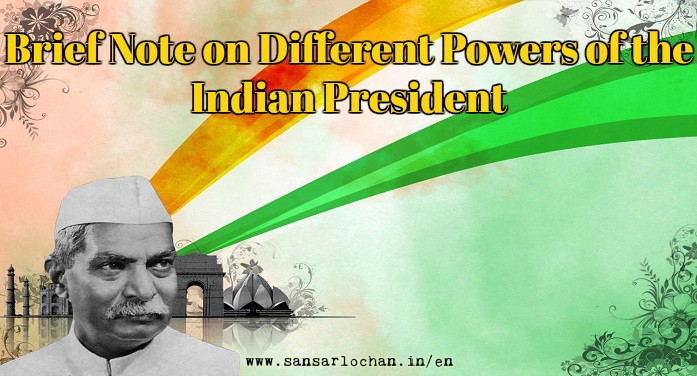India is a republic. Its administration is headed by the President. However he is a constitutional ruler only. The country is governed in fact by the Prime Minister and his cabinet. Nevertheless the President enjoys some powers which may be categorized as 1. Executive Powers 2. Legislative Powers 3. Financial Powers 4. Judicial Powers 5. Emergency Powers.
Executive Powers
He is vested with the powers of appointment i.e. he appoints the Governors of the States, the Judges of the High Courts and Supreme Court and their Chief Justices, the members of the of the Union Public Service Commission, the Auditor-General and the Comptroller-General and the Attorney General; besides, he makes all diplomatic appointments. He is the Supreme Commander of the Armed Forces of India. Beside appointing the chiefs of the army, the navy and the air force he can declare war or conclude peace, subject to the approval of the parliament. He governs the Union Territories through the Chief Commissioners who are appointed by him. He calls upon the leader of the majority party to choose his Cabinet, and the latter is appointed as the Prime Minister.
Legislative Powers
He may address either House of the Parliament; send messages to either House containing matters that he wants to be re-considered by the House. He has also the power to dissolve the Lower House, and other fresh elections. Any bill passed by Parliament must receive his assent, before it becomes an Act. He summons a joint sitting of both the Houses of Parliament. He addresses the Parliament at the commencement of he first session after each general election and the first session of each year. He decides on matters of disqualifications of members of the Parliament, in consultation with the Election Commission. The President’s prior recommendation is needed to introduce certain types of bill involving expenditure from the Consolidated Fund of India, or the alteration of boundaries of states or creation new state. The President can also promulgate ordinances when the Parliament is not in session which can be retrospective in nature and follows the same rules. He is empowered to make regulations and laws for the Andaman & Nicobar Islands and Lakshadweep, Minicoy and Amindivi Islands. He can promulgate an Ordinance, when the Parliament is not in session. The President promulgated an Ordinance in 1960 declaring the strike of the Central Govt. employees illegal.
Financial Powers
No money bill and demand for grant can be introduced or moved in the Parliament, unless it has been recommended by the President. He lays before the Parliament the annual financial statement (i.e., the Union Budget). No demand on his recommendation.
Judicial Power
He has power to grant pardon, reprieve, or remission of punishment or commute death sentences. Under article 72, President has been empowered with pardoning power which includes:-
- Pardon: Completely absolves the convict from all sentences, punishments and disqualifications.
- Communication: Substitution of one from of punishment for a lighter form.
- Remission: Reducing the period of sentence without changing its character.
- Respite: Awarding a lesser sentence in place of one originally awarded due to some special reason.
- Reprieve: Stay of the execution of a sentence (specially that of death) for a temporary period to enable the convict to have time to seek pardon or communication from the President.
He is also responsible for the appointment of Chief Justice and the judges of the SC and HC.
Emergency Powers
In any emergency caused by war, aggression or internal disturbances or by the failure of the constitutional machinery or by financial instability, the President can proclaim a state of emergency, and he can take under his direct charge the administration of any State in India. These powers were employed in the case of Punjab in 1951, P.E.P.S.U. in 1953 and Kerala, in 1954, in 1956 and again in 1959.
The Constitution confers extraordinary powers on the President during : –
- National Emergency (Article 352)
- President’s Rule (Article 356 & 365)
- Financial Emergency (Article 360)
